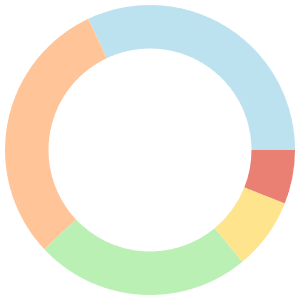Low-carb meal plan for vegetarian
The Low-Carb meal plan for vegetarians balances the principles of a low carbohydrate diet with a plant-based approach. It includes a variety of non-starchy vegetables, plant-based proteins, and healthy fats, ensuring a nutritious and balanced diet that aligns with vegetarian dietary preferences.




Meal plan grocery list
- Greek yogurt
- Almonds
- Chia seeds
- Avocado
- Chickpeas
- Olive oil
- Cucumber
- Hummus
- Portobello mushrooms
- Brussels sprouts
- Tofu
- Spinach
- Cauliflower rice
- Walnuts
- Zucchini
- Pesto sauce
- Berries
- Feta cheese
- Apple
- Almond butter
- Eggplant
- Cottage cheese
- Quinoa
- Cherry tomatoes
- Sunflower seeds
- Tempeh
- Low-carb bread
Meal plan overview
Explore a plant-based approach to low-carb diets with the Low-carb meal plan for vegetarians. This plan offers a variety of tasty, low-carb vegetarian dishes.
Rich in vegetables, legumes, and healthy fats, it’s a unique blend of low-carb eating and a vegetarian diet for balanced carb intake, blood sugar control, and manageable weight loss.

Foods to eat
- Vegetable Proteins: Tofu, tempeh, and seitan as meat alternatives.
- Low-Carb Vegetables: Spinach, kale, zucchini, and mushrooms.
- Nuts and Seeds: Almonds, walnuts, chia seeds, and flaxseeds.
- Healthy Fats: Olive oil, coconut oil, and avocado oil.
- Dairy or Plant-Based Alternatives: Cheese, Greek yogurt, and almond or coconut milk.
- Low-Sugar Fruits: Berries and avocados.
- Eggs: If ovo-vegetarian, for a good source of protein.
- Herbal Teas and Water: For hydration.
✅ Tip
Experiment with incorporating seaweed into your meals, as it is a rich source of iodine, which is important for thyroid health and metabolism regulation.
Foods not to eat
- High-Carb Foods: Bread, pasta, and rice.
- Starchy Vegetables: Potatoes and corn.
- Sweetened Dairy Alternatives: Flavored soy or almond milk with added sugars.
- Processed Vegetarian Foods: Often high in carbs and additives.
- Fried Vegetarian Foods: High in unhealthy fats and carbs.
- Sugary Snacks: Cookies, candies, and cakes.
- Alcohol: Can be high in sugars and carbs.
- Refined Sugars: In desserts and sweetened beverages.
Main benefits
The low-carb vegetarian diet balances the principles of low carbohydrate diets with a plant-based approach. It includes a variety of low-carb foods, non-starchy vegetables, plant-based proteins, and healthy fats, ensuring a nutritious and balanced diet that aligns with vegetarian dietary preferences. Enjoy such health benefits as healthy skin, manageable blood glucose levels and blood pressure.

Fat
Carbs
Protein
Fiber
Other
Food alternatives
A low-carb meal plan for vegetarians can be both satisfying and diverse with these substitutions:
- Incorporate tempeh instead of tofu for a different texture and higher protein content.
- Swap brown rice with farro to add variety to your grain choices.
- Try pistachios for a unique nutty flavor instead of walnuts.
- Add bok choy instead of spinach for a different leafy green option.
- For a fun twist, use sweet potato noodles instead of whole grain wraps.
How to budget on this meal plan
Bulk-buy staples like Greek yogurt, almonds, and chia seeds. Avocado, chickpeas, and olive oil are versatile ingredients that can be used in multiple dishes. Seasonal vegetables and fruits are usually more affordable. Consider making your own pesto and hummus for cost savings. Tofu and tempeh are affordable protein sources that can be used in a variety of recipes.

Extra tips
Any healthy snack ideas?
Delicious and low-carb vegetarian snacks:
- Caprese salad skewers
- Baked zucchini fries
- Eggplant rounds with pesto
- Mozzarella sticks (baked)
- Stuffed avocados with cheese
- Roasted Brussels sprouts
- Vegetable sushi with cauliflower rice
What should I drink on this meal plan?
For vegetarians following a low-carb diet, water remains the most important beverage. Herbal teas offer a soothing, calorie-free choice and can help lose weight. Unsweetened almond or soy milk can be used as dairy alternatives. Black coffee is fine, and green tea provides antioxidants beneficial for overall health.
How to get even more nutrients?
For vegetarians on a low-carb diet, getting enough protein and essential nutrients without relying on high-carb legumes and grains is a challenge. Rely on high-protein dairy products like Greek yogurt and cheese, along with eggs if acceptable. Low-carb vegetables like mushrooms, spinach, and kale are staples, and nuts and seeds can supplement your intake of fats and proteins while lowering blood pressure. Almond flour and coconut flour are useful for baking and cooking without the carbs.
Meal plan suggestions
Low-Carb Vegetarian Meal Plan
Day 1
- Breakfast: Greek yogurt with almonds and a sprinkle of chia seeds (calories: 300, protein: 18g, carbs: 10g, fat: 20g)
- Lunch: Avocado and chickpea salad with olive oil dressing (calories: 350, protein: 15g, carbs: 20g, fat: 20g)
- Snack: Cucumber slices with hummus (calories: 150, protein: 6g, carbs: 10g, fat: 8g)
- Dinner: Grilled portobello mushrooms with a side of roasted Brussels sprouts (calories: 400, protein: 15g, carbs: 20g, fat: 25g)
Day 2
- Breakfast: Scrambled tofu with spinach and mushrooms (calories: 250, protein: 20g, carbs: 10g, fat: 15g)
- Lunch: Cauliflower rice stir-fry with mixed vegetables and tofu (calories: 300, protein: 18g, carbs: 15g, fat: 18g)
- Snack: A handful of walnuts (calories: 180, protein: 4g, carbs: 4g, fat: 18g)
- Dinner: Zucchini noodles with pesto sauce (calories: 350, protein: 10g, carbs: 15g, fat: 25g)
Day 3
- Breakfast: Chia seed pudding made with almond milk and berries (calories: 280, protein: 6g, carbs: 20g, fat: 15g)
- Lunch: Spinach and feta cheese stuffed bell peppers (calories: 320, protein: 12g, carbs: 15g, fat: 20g)
- Snack: Sliced apple with almond butter (calories: 200, protein: 2g, carbs: 20g, fat: 12g)
- Dinner: Eggplant Parmesan with a side of mixed greens (calories: 400, protein: 15g, carbs: 20g, fat: 25g)
Day 4
- Breakfast: Cottage cheese with a few raspberries (calories: 200, protein: 15g, carbs: 10g, fat: 8g)
- Lunch: Quinoa salad with cherry tomatoes, cucumber, and avocado (calories: 350, protein: 12g, carbs: 30g, fat: 18g)
- Snack: Greek yogurt with a sprinkle of sunflower seeds (calories: 180, protein: 10g, carbs: 10g, fat: 10g)
- Dinner: Baked tempeh with a side of asparagus (calories: 350, protein: 20g, carbs: 15g, fat: 20g)
Day 5
- Breakfast: Avocado toast on low-carb bread (calories: 250, protein: 10g, carbs: 15g, fat: 18g)
- Lunch: Lentil soup with a side salad (calories: 300, protein: 18g, carbs: 25g, fat: 10g)
- Snack: A small pear with a handful of almonds (calories: 150, protein: 4g, carbs: 15g, fat: 10g)
- Dinner: Vegetable curry with coconut milk (calories: 400, protein: 10g, carbs: 25g, fat: 30g)
Day 6
- Breakfast: Protein shake with unsweetened almond milk and spinach (calories: 200, protein: 20g, carbs: 6g, fat: 10g)
- Lunch: Chickpea and vegetable salad with olive oil and lemon dressing (calories: 350, protein: 12g, carbs: 30g, fat: 18g)
- Snack: Bell pepper slices with guacamole (calories: 150, protein: 2g, carbs: 10g, fat: 12g)
- Dinner: Stuffed portobello mushrooms with ricotta and spinach (calories: 300, protein: 15g, carbs: 15g, fat: 18g)
Day 7
- Breakfast: Smoothie with almond milk, protein powder, and a small amount of berries (calories: 250, protein: 20g, carbs: 15g, fat: 10g)
- Lunch: Baked tofu with a side of sautéed kale and Brussels sprouts (calories: 350, protein: 25g, carbs: 20g, fat: 20g)
- Snack: A small serving of cottage cheese with sliced cucumber (calories: 120, protein: 12g, carbs: 5g, fat: 5g)
- Dinner: Grilled vegetable skewers with a quinoa and black bean salad (calories: 400, protein: 15g, carbs: 30g, fat: 20g)

Want to learn more?
⚠️ Keep in mind
As with any dietary change, it is recommended to consult with a healthcare professional or registered dietitian before changing your dietary habits.





